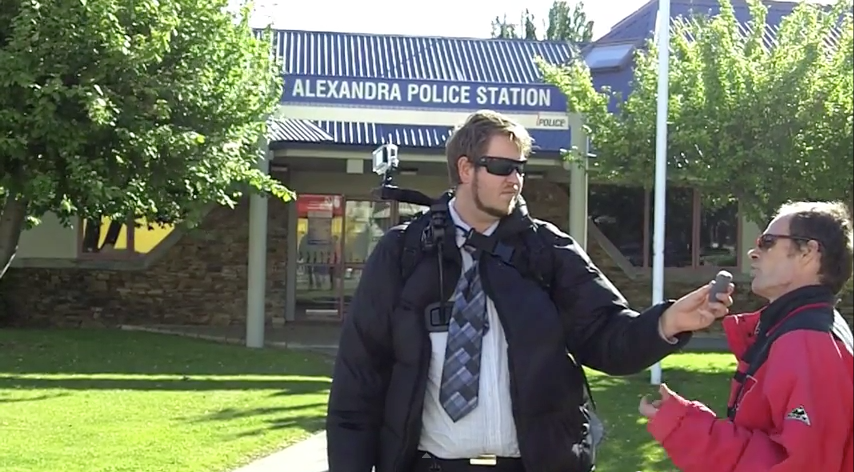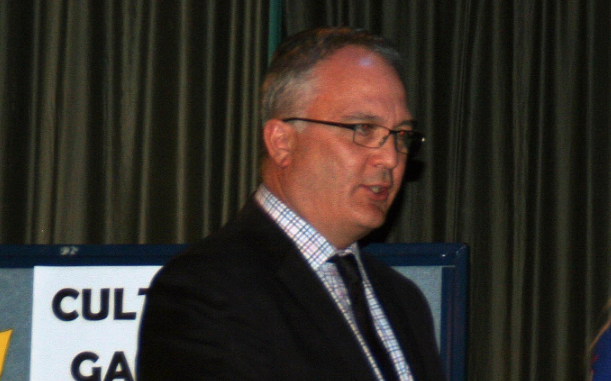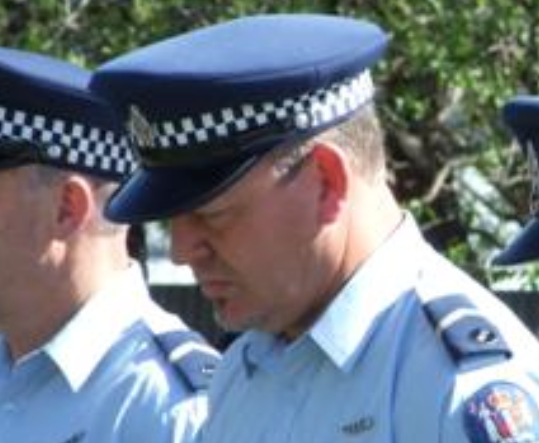
Chris Wardill of Clyde Central Otago being interviewed by Vinnie Eastwood outside the local police Station, Wardill now joins ex MP Tua Hererai as the latest Kiwi to be charged by police with breaking a name suppression order.
Clyde man Chris Wardill (above right) was back in court yesterday, as was Central Otago police prosecutor extraordinaire, Sergeant Ian Collin. Sergeant Collins, an old hand in the police’s dark arts seemed to be flummoxed from the get go with his police credibility spells and fart-speak falling on deaf ears.
The first to be pulled from Sergeant Collins arsehole was the old, “does it really matter” ploy. The police had wanted Wardill to enter a plea, obviously they had hoped for a quick “guilty as charged’, but that’s not what Sergeant Collins got.
Instead he was countered with the rather nasty issue of the police’s failure to disclose. Now this is probably the most often used strategies. Police simply don’t give the accused what they are legally entitled to, the full disclosure of their case against the accused, little things such as evidence is not important, at least it seems to be the general position within the New Zealand police force, or perhaps its just their prosecutors?
Regular readers will remember our last piece on Mr Wardill and a little article by the Otago Daily times, where the paper took the position;
“The Otago Daily Times decided not to identify the man as it could lead to the identification of the former police officer”.
Source: http://www.odt.co.nz/news/dunedin/329824/suppression-breaches-often-inevitable
Well we can’t be 100% certain of the editors reasoning but that particular newspaper has obviously changed its position, perhaps when they saw what had occurred during yesterdays proceedings, whatever the reason, an article that appeared this morning is certainly evidence of the sudden about-face;
Full disclosure sought in name suppression case
Tue, 20 Jan 2015
A Clyde man who was watching Alexandra District Court proceedings from the public gallery later allegedly breached a suppression order, the court heard yesterday.
Christopher Wardill (45) appeared in court facing a charge of breaching suppression by knowingly publishing the suppressed name and occupation of a defendant on December 12.
Wardill’s application for legal aid had been declined so he was not represented by a lawyer yesterday.
Judge Dominic Flatley said Wardill could see the duty solicitor but he declined, saying he had ”no option” but to deal with the matter himself.
Asked to plead to the charge, Wardill said he was unable to enter a plea until he had full disclosure of all evidence from the police.
Prosecutor Sergeant Ian Collin said initial disclosure had been granted and that was sufficient for a plea to be entered, but full disclosure could be made.
The defendant said he made two requests for disclosure from police. He had sent an email requesting it and also contacted a policeman early that morning, requesting full disclosure.
Sgt Collin asked for a further condition to be added to Wardill’s bail conditions, banning the defendant from attending a court sitting this week.
Although proceedings were open, ” … it was his previous appearance in the public gallery that led to this allegation before the court,” he said.
It would be ”inappropriate” for him to attend that sitting, Sgt Collin said, but Judge Flatley declined to add that as a bail condition.
The judge said Wardill had to plead to the charge at his next court appearance and he was remanded on bail to reappear on February 16.
Source: http://www.odt.co.nz/regions/central-otago/330502/full-disclosure-sought-name-suppression-case
The title of the article might just be a dead giveaway, “Full disclosure sought in name suppression case”. Perhaps the editor too has seen through the police’s prosecutorial misconduct?
The fact is that Mr Wardill is, as is any defendant, entitled to full disclosure of the police case against him, this is a fundamental principle of the legal system of all commonwealth countries, not just little old New Zealand. Although it would seem that the New Zealand police are very much alone in using this old as the hills police tactic.
Sergeant Collin’s, a prosecuting cop of many years experience, would certainly have known that the police had yet again tried to pull the wool over Mr Wardill’s eyes. Sergeant Collin’s offered no reasons for the police’s failure to abide by the rules. However we do not need sergeant Collin’s bullshit excuses to know that the police had planned, in this case, from the outset;
Mr Wardill pointed out to the judge, Dominic Flatley DCJ, that he had twice requested full diclosure from the police, once in an email and again yesterday morning before the court sitting.
In fact, LF’s article of the 16th January we noted that Wardill had asked for the information, and that amongst other things Wardill had wanted and specifically been refused a copy of his record of police interview:
The police have also refused to give Wardill a copy of his recorded police interview, their excuse being that if they did it would end up online….well they were probably not wrong in that assessment, however the fact is, whilst we would not advise speaking to police, Wardill is entitled a copy of any formal statement he has made, or any transcript or audio recording of an interview, and he is also entitled to do as he pleases with it.
Source:http://laudafinem.com/2015/01/16/suppression-breaches-often-inevitable-when-police-attempt-to-conceal-corruption/
This is contemporaneous evidence of at least one of Mr Wardill’s attempts to obtain disclosure from the police, it is also at least one account of the reasons advanced by police, at the time, for not having given Wardill what he was legally entitled to. The police don’t get to make up the rules as they go along, simply changing willy nilly whatever doesn’t suit their often nefarious agenda. In fact the rules are there specifically to prevent this bullshit occurring, legal history is littered with precedents that stand as sentinels, guarding against this blatant abuse of legal process.

Senior Sergeant Ian Kerrisk, the cop responsible for charging Chris Wardill – What is the good sergeant hiding?
For sergeant Collin to then stand up, offering absolutely no explanation, and declare that an “initial disclosure had been granted and that was sufficient for a plea to be entered, but full disclosure could be made” was frankly quite unbelievable, especially Collin’s assurance that ‘full disclosure would be made’. If it had not already been made available, in accordance with the law, why would anyone believe the fucking slime-ball? It was pure prosecutorial misconduct, just why it was that the judge did not throw the case out is frankly beyond us. District Court Judge Flatley would have known that Sergeant Collin was no novice, devoid of any knowledge of what was expected, in fact of what was legally required.
In fact Ian Peter Collin has some pretty serious history when it come’s to this form of malignant legal practice (see: Barristers, Hookers, Fraudsters & Bent Cops – The Paul Currie Case)
As is also pointed out above, the police did not want Mr Wardill to have disclosure because they did not want the public knowing what has transpired;
their excuse being that if they did it would end up online
As we have already pointed out (ad nauseam), whether the evidence police intended using to prosecute Wardill appeared online or not is quite irrelevant to the police’s obligation to hand over that evidence in the form of full disclosure to the accused.
On that note, team LF have been led to believe that the threat to arrest Mr Wardill was again an issue raised during yesterdays court proceedings. This time by the Ian Collins in conversation with Judge Flately. The judge apparently advising Collins that the police were free to arrest Mr Wardill should the police case against Mr Wardill (the aformentioned disclosure) end up online. Another very open abuse of police power, an unlawful threat we would have thought. It is also a threat that the Otago Daily Times seem to have intentionally ommitted from their article above – now why would that be? Exactley what charge did judge Flatley have in mind? What charge did police have in mind for that matter? From what we can see Flatley DCJ made no orders with respect to the desemination of the aforementioned police disclosure – If true this recollection is indeed of serious concern.
The legal system as we know it depends on this form of full and frank disclosure, it’s often referred to as “open justice“. From the perspective of dissemination to the public, as is also a basic tenet of our western democracies, things may have changed a little, but only in so far as who gets to ensure the public do get to see all the facts. It was a job that for centuries fell to the fourth estate to execute, although that particular pillar of democracy has in recent times also fallen by the wayside with citizens now beginning to favour smaller boutique online sources for their daily intake of news and commentary. Perhaps it has something to do with media monopolies and the agendas of the billionaire media moguls, the likes of Rupert Murdoch, who have over the past two decades slowly taken ownership of the old fourth estate?
So why would the police not want information that citizens are inherently entitled to be being made public?
Well the answers are of course all too obvious in this particular case. With the old fourth estate the police in New Zealand had been able to maintain a certain degree of control, behind which they could and did get away with murder. With the advent of the new “fifth estate” however, the aforementioned boutique online sources, that control no longer exists, hence the recent behaviour of the New Zealand police. It’s not just in this case however there have been many other examples of this form of police skullduggery over the past nine or so years.
Sergeant Collins knew full well what he was doing, Collins understood that he was attempting to mislead the judge, to screw Mr Wardill, fuck any chance of a fair trial and in the process also prevent the police plan to extricate their pervert friend, the paedophile porno king of the central Otago constabulary, senior constable John Clarke, from derailing and making media headlines.
Collins agenda is transparent on that account. As the Otago Daily Times peice above points out;
Sgt Collin asked for a further condition to be added to Wardill’s bail conditions, banning the defendant from attending a court sitting this week.
Although proceedings were open, ” … it was his previous appearance in the public gallery that led to this allegation before the court,” he said.
Obviously then New Zealander’s must need to have the fact that all court processes are “OPEN”, in fact the law specifically provides for it, save for extenuating circumstances, wherein an application needs to be made and strong argument put before it will even be considered, explained to them. Perhaps that’s because over the years Kiwi’s have been mislead on what constitutes justice?
Sergeant Collin was really trying it on with this application and the judge was right to deny it. To deny any citizen the right to witness open justice is a draconian step. So why then did Sergeant Collins even attempt it?
It was never for Collins or Judge Flatley to decide who could attend another court proceeding, Judge Flatley was clearly aware of that fact, its the sort of decision that can only really be made by the judge presiding over the other matter in question.
So was it yet another attempt to prevent the public getting to know what was transpiring in the matter of senior constable John Clarke’s sentencing and his seriously dodgy application for a discharge without conviction? LF suspects that both the Crown (aka the police) and the defence will again pull this stunt tomorrow morning (9:00am, 21st January 2015) when senior constable John Clarke’s matter kicks off.
LF would suggest that the good citizens of central Otago take themselves along to the court and bear witness to whatever unfolds, we suggest this for two reasons, the first to ensure that justice remains open to scrutiny and that the police, crown and defence are not able to fuck over yet another victim of police sexual abuse. The second reason, that the Otago police get the message that their bullying and abuse of people’s legal rights will not go unnoticed and that despite their best efforts police get the very clear message that trying to conceal their behavior from the public will only make matters worse. Police need to be given the very loud message that the good old boys good old days are now over, gone for ever!
A show of public strength and unity is required, as is a strong display of public support for Mr Chris Wardill.
On another note. It would seem that Judge Domonic Flatley also has a little history with the good folk of Central Otago. Some amongst the population clearly despising his honour. Without much searching LF managed to find quite a lot of pretty disparaging material, all focusing on Dominic Flatley DCJ. Sure judges need to remain above this type of behaviour, but the question needs to be asked, what has inspired this very nasty revolt? What is it about Flatley that has caused this hate campaign?
With that in mind, whilst Flatley DCJ appears to have played by the rules so far, is he really the right judge to be hearing this particular case? Remember justice also needs to be seen to be done.
Update: LF has been advised by a number of our Kiwi readers that the above YouTube video has suddenly had a country block placed on it, that Kiwi’s wishing to view the video are unable to do so. LF has further been advised that viewers instead receive the message “This content is not available on this country domain due to a legal complaint”.
It seems that the sudden geoblocking of this video is as a result of the New Zealand police’s cosy little relationship with YouTube and Google New Zealand and the New Zealand police’s concern that LF readers might just get to see one amongst the many problems associated with Judge Dominic Flatley continuing to preside over the Wardill trial.
If there had been a genuine legal complaint it would have taken a lot longer than just two hours for YouTube to process. Whats more Youtube would have pulled the video completely, not simply placed a geoblock on the content.
That then beggars the question, just how far will a corrupt police force go to prevent the public from seeing how justice is administered in Central Otago, warts and all?
In the interests of open justice, transparency and free speech LF have decided to provide the video in question using a platform other than YouTube. It is indeed disappointing that YouTube plays the New Zealand police game despite claiming to do otherwise!



1 Comment
I have a recording of Alexandra police station where they had no idea they were being recorded…il be taking my case to parliament/high/supreme court in a few weeks cuz I caught the police out scheming to destroy people in my recording. Its amazing what they say when they have no idea theyre being recorded.